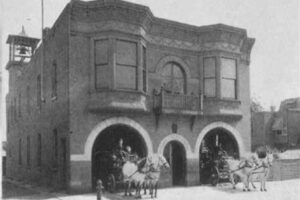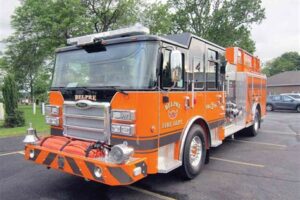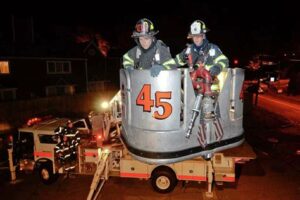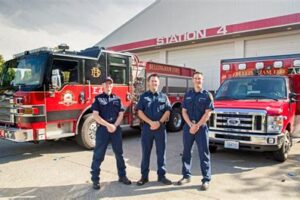Table of Contents
Looking to become a volunteer fire fighter? Our comprehensive training program will equip you with the essential skills and knowledge needed to serve your community. From firefighting techniques to first aid and emergency response, our expert instructors will provide hands-on training to ensure you are prepared for any situation. Join us today and make a difference as a dedicated volunteer fire fighter.
When disaster strikes, brave individuals step forward to protect their communities with unwavering courage and selflessness. These everyday heroes are volunteer firefighters, ordinary citizens who dedicate their time and effort to undergo rigorous training in order to face the daunting challenges that come with firefighting. From battling raging infernos to rescuing trapped individuals, these brave men and women demonstrate remarkable resilience in the face of danger. In this article, we delve into the world of volunteer firefighter training, exploring the transformative journey these individuals embark upon as they learn the essential skills needed to save lives and safeguard their communities.
The Importance of Volunteer Firefighters
Volunteer firefighters play a crucial role in ensuring the safety and well-being of communities. They are often the first responders to emergencies, putting their lives on the line to protect others. These brave individuals undergo rigorous training to acquire the necessary skills and knowledge needed to handle a wide range of emergency situations. In this article, we will explore the training process for volunteer firefighters and shed light on the dedication and commitment required to become a part of this noble profession.
Basic Firefighting Training
The journey to becoming a volunteer firefighter begins with basic firefighting training. This comprehensive program covers essential topics such as fire behavior, safety protocols, equipment operation, and rescue techniques. Participants learn about different types of fires, how they spread, and the appropriate extinguishing methods. Through hands-on exercises and simulations, trainees gain practical experience in using various firefighting tools and equipment.
Medical Training and First Aid
Firefighters often find themselves in situations where medical assistance is required. Therefore, volunteer firefighters also receive training in basic medical techniques and first aid. This enables them to provide initial care to victims before professional medical help arrives. They learn how to assess injuries, control bleeding, perform CPR, and stabilize patients. This additional training equips them with the skills to handle emergencies beyond fires.
Hazardous Materials Awareness
In today’s world, firefighters encounter hazardous materials in many emergency scenarios. To address this, volunteer firefighters undergo specialized training in hazardous materials awareness. They learn how to identify hazardous substances, assess risks, and implement appropriate containment and decontamination procedures. This knowledge is vital for keeping themselves and others safe while dealing with potentially dangerous situations.
Search and Rescue Techniques
Volunteer firefighters are often called upon to perform search and rescue operations in various environments. They receive training in techniques such as victim assessment, building searches, and extrication. These skills enable them to locate and safely extract individuals trapped in hazardous situations, whether it be a collapsed building, vehicle accident, or natural disaster.
Vehicle and Machinery Operations
To effectively respond to emergencies, volunteer firefighters must also have a solid understanding of vehicle and machinery operations. They learn how to safely drive fire trucks and other emergency vehicles, operate pumps and hoses, as well as handle specialized equipment. This training ensures they can efficiently navigate through traffic and arrive at the scene ready to provide assistance.
Wildland Firefighting
Volunteer firefighters may find themselves battling wildfires that threaten homes and natural areas. Training in wildland firefighting equips them with the knowledge and techniques needed to combat these challenging fires. They learn about fire behavior in wildland settings, proper use of protective gear, and strategies for containing and extinguishing forest fires.
Continuous Education and Skill Development
Firefighting is a dynamic field, and new techniques and technologies constantly emerge. To stay up-to-date, volunteer firefighters engage in continuous education and skill development programs. These programs provide opportunities to expand their knowledge, enhance existing skills, and learn about the latest advancements in firefighting equipment and tactics.
Physical Fitness and Wellness
Being a volunteer firefighter requires physical strength and endurance. Training programs emphasize the importance of physical fitness and wellness to ensure firefighters can perform their duties effectively. Regular exercise routines, along with nutrition and mental health guidance, are incorporated into the training process to support the overall well-being of the firefighters.
Teamwork and Collaboration
Firefighting is a team effort, and effective collaboration is essential for success. Volunteer firefighters undergo training that emphasizes teamwork and communication skills. They learn how to work harmoniously with their fellow firefighters, emergency personnel, and community members to achieve common goals and ensure everyone’s safety.
A Tribute to Volunteer Firefighters
Volunteer firefighters are everyday heroes who selflessly dedicate their time and energy to protect their communities. Their commitment to training and readiness ensures they can face any emergency head-on. So, the next time you see a volunteer firefighter in action, remember the extensive training they have undergone to serve and safeguard the lives of others.
The Essential Training for Volunteer Firefighters
In small communities across the nation, dedicated individuals volunteer their time and energy to serve as firefighters. These selfless heroes undergo rigorous training to acquire the skills and knowledge necessary to keep their neighborhoods safe in times of crisis. From firefighting techniques to emergency medical care, their training equips them with the tools to respond swiftly and effectively to any disaster.
Basic Firefighting Techniques: Honing the Skills of New Recruits
Volunteer firefighter training begins with an emphasis on basic firefighting techniques. Recruits learn about fire behavior, extinguisher usage, and search and rescue operations. With hands-on practice in simulated fire scenarios, they gain confidence in their ability to combat and control these dangerous situations.
Hazardous Material Handling: Protecting Communities from Chemical Threats
Recognizing the increasing prevalence of hazardous materials in residential areas, volunteer firefighters are trained in handling chemicals safely. They learn to identify hazardous substances, assess risks, and mitigate their potential harm. This vital training not only protects the firefighters themselves but also enables them to safeguard their communities from potentially catastrophic consequences.
Emergency Medical Response: Saving Lives in the Community
Often, volunteer firefighters are the first to arrive at medical emergencies, making their knowledge of emergency medical care crucial. Through comprehensive training, they learn life-saving techniques such as CPR, wound management, and emergency childbirth procedures. Their ability to provide immediate assistance can make all the difference in critical situations where every second counts.
Vehicle Extrication: Rescuing Trapped Victims Safely and Swiftly
Car accidents and other vehicular incidents require specialized skills to safely free trapped victims. Volunteer firefighters receive training in vehicle extrication techniques, using tools such as hydraulic cutters and spreaders to remove wreckage and extricate passengers efficiently. This training ensures that they can quickly navigate these complex situations and save lives in the process.
Wildfire Suppression: Combating Nature’s Wrath
In areas prone to wildfires, volunteer firefighter training includes wildfire suppression tactics. Firefighters are educated on fire behavior in woodland areas, the importance of creating firebreaks, and the deployment of specialized equipment. Armed with this knowledge, they work alongside professional firefighters to protect forests, homes, and lives from the devastating effects of wildfires.
Technical Rescue: Navigating Challenging Situations
Emergencies can arise in various settings, requiring specialized knowledge and skills. Volunteer firefighters undergo training in technical rescue techniques, including high-angle rescue, trench rescue, and confined space operations. This diverse training equips them with the ability to handle complex, dangerous scenarios, providing assistance when called upon in their roles as first responders.
Continued Education and Ongoing Training: The Commitment to Lifelong Learning
Despite their volunteer status, dedicated firefighters recognize the importance of continuous education and ongoing training. They regularly attend seminars, conferences, and workshops to refine their skills and stay updated on the latest firefighting strategies. The commitment to lifelong learning ensures that volunteer firefighters can consistently deliver the highest level of service to their communities, always ready to protect and serve at a moment’s notice.
Point of View: Journalist’s Perspective
Volunteer Fire Fighter Training: A Crucial Step Towards Community Safety
1. Introduction:
Volunteer fire fighters play an indispensable role in ensuring the safety and well-being of local communities. These brave individuals willingly dedicate their time and energy to protect lives and properties, often at great personal risk. However, their effectiveness greatly depends on the quality of their training. In this article, we explore the significance of volunteer fire fighter training and its impact on community safety.
2. Comprehensive training programs:
Volunteer fire fighters undergo rigorous and comprehensive training programs that equip them with the necessary skills and knowledge to respond effectively to emergencies. These programs encompass a wide range of disciplines, including firefighting techniques, rescue operations, hazardous materials management, and first aid. By investing time and effort into these training initiatives, volunteers become better equipped to handle different emergency situations and minimize potential risks.
3. Enhancing response capabilities:
The primary objective of volunteer fire fighter training is to enhance their response capabilities. Well-trained volunteers possess the ability to quickly assess and analyze emergency situations, allowing them to take prompt and appropriate action. Through simulated exercises and practical drills, trainees learn how to manage fire incidents, conduct search and rescue operations, and provide critical medical assistance. This hands-on training enables them to respond efficiently and effectively during real emergencies, thereby safeguarding lives and limiting property damage.
4. Building teamwork and camaraderie:
Volunteer fire fighter training serves as a platform for fostering teamwork and camaraderie among the participants. Collaborative exercises and group simulations develop a strong sense of trust and reliance among the volunteers. This cohesive bond is essential during emergency situations, where effective communication and coordination are crucial. Well-coordinated efforts by trained volunteers can significantly improve response times and the overall effectiveness of firefighting operations.
5. Continuous learning and skill development:
Volunteer fire fighter training is an ongoing process that emphasizes continuous learning and skill development. As technology advances and new emergency scenarios emerge, it is essential for volunteers to stay updated with the latest techniques and practices. Training programs provide opportunities for volunteers to expand their knowledge base through workshops, seminars, and specialized courses. By keeping up with the latest advancements in firefighting and rescue techniques, volunteers can adapt to ever-evolving challenges and ensure the highest level of community safety.
6. Conclusion:
Volunteer fire fighter training plays a pivotal role in maintaining community safety. It equips volunteers with the necessary skills, knowledge, and mindset to respond effectively to emergencies. By continuously investing in comprehensive training programs, communities can rely on their volunteer fire fighters to promptly and efficiently handle various critical situations. The dedication and commitment displayed by these selfless individuals deserve our utmost respect and support.
Thank you for taking the time to visit our blog and learn more about the Volunteer Fire Fighter Training program. We hope that the information provided has been valuable and has given you a deeper understanding of the importance of this initiative. As we conclude, let us recap some of the key points discussed throughout the article.
First and foremost, we highlighted the vital role that volunteer firefighters play in our communities. These brave individuals selflessly dedicate their time and effort to protect lives, property, and the environment during emergencies. By undergoing comprehensive training, volunteer firefighters acquire the necessary skills and knowledge to effectively respond to various incidents, including fires, accidents, and natural disasters. This training equips them with the ability to assess situations, provide immediate assistance, and coordinate efforts with other emergency personnel, ensuring the safety and well-being of all community members.
Moreover, we emphasized that volunteer firefighter training is not only beneficial for the individuals who choose to participate but also for the community as a whole. By becoming a trained volunteer firefighter, individuals gain a sense of purpose, accomplishment, and fulfillment. They become part of a close-knit team, forged by the shared experiences and challenges they face together. Additionally, their newfound skills and expertise can extend beyond firefighting, enabling them to contribute to other areas of community service, such as first aid, disaster response, and public education. Thus, volunteer firefighter training serves as a catalyst for personal growth, empowerment, and active civic engagement.
In conclusion, we would like to encourage those who have an interest in becoming volunteer firefighters to explore the opportunities available in their local communities. Whether you are driven by a desire to help others, a passion for making a difference, or a thirst for new experiences, volunteer firefighter training can offer you a rewarding and fulfilling journey. Remember, the path to becoming a volunteer firefighter may not always be easy, but the impact you can have on the lives of others is immeasurable. So, step forward, embrace the challenge, and join the ranks of those who selflessly serve and protect our communities as volunteer firefighters.
Thank you once again for joining us on this informative journey. We hope that you found this blog post enlightening and inspiring. If you have any further questions or would like to learn more about volunteer firefighter training, please do not hesitate to reach out to your local fire department or community organizations dedicated to firefighting. Together, let us support and appreciate the invaluable contributions made by these everyday heroes in ensuring our safety and well-being.
.
People also ask about Volunteer Firefighter Training:
What is involved in volunteer firefighter training?
How long does it take to become a volunteer firefighter?
Is volunteer firefighter training physically demanding?
Do volunteer firefighters receive any certifications?
Can volunteer firefighter training lead to a career in firefighting?
Volunteer firefighter training involves a combination of classroom instruction and hands-on practical exercises. Participants learn about fire safety, emergency medical procedures, hazardous materials awareness, and rescue techniques. They also receive training in operating firefighting equipment, handling ladders and hoses, and performing search and rescue operations. Additionally, volunteers are trained on how to work effectively as a team and respond to different types of emergencies.
The duration of volunteer firefighter training can vary depending on the specific requirements set by the fire department. On average, the training program lasts between 6 to 12 weeks. This timeframe allows volunteers to gain the necessary knowledge and skills to handle emergency situations confidently. However, it’s important to note that training is an ongoing process, and firefighters often engage in regular drills and continuous education to stay up-to-date with the latest techniques and safety protocols.
Yes, volunteer firefighter training can be physically demanding. Firefighters are required to possess a certain level of physical fitness to perform their duties effectively. Training exercises often involve strenuous activities such as climbing ladders, carrying heavy equipment, and engaging in intense firefighting simulations. It is essential for volunteers to maintain a good level of physical health and endurance to ensure they can handle the physical challenges of the job.
Yes, volunteer firefighters can earn various certifications based on their training and experience. Common certifications include Firefighter I and II, CPR and First Aid, Hazardous Materials Awareness, and Incident Command System. These certifications not only validate the skills and knowledge of volunteer firefighters but also enhance their credibility and effectiveness during emergency response situations.
Absolutely! Volunteer firefighter training can serve as a stepping stone towards a professional career in firefighting. Many individuals start as volunteers to gain experience and build their skill set before pursuing paid positions within fire departments. The comprehensive training received as a volunteer firefighter provides a solid foundation for those who aspire to become career firefighters. Additionally, the experience gained through volunteering can significantly improve one’s chances of securing employment in the firefighting industry.






